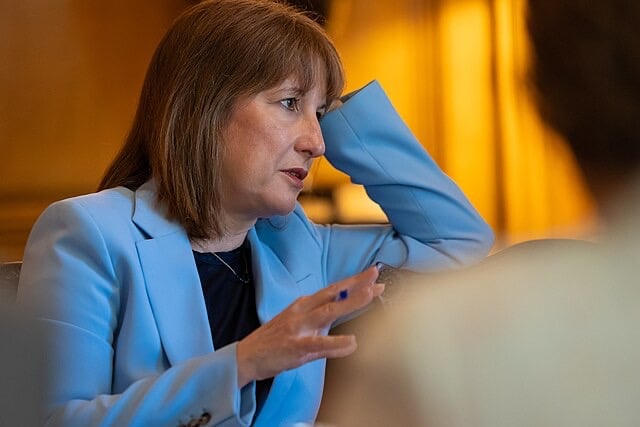Labour’s flagship pledge to make Britain the fastest growing economy in the G7 is lying in tatters after the International Monetary Fund revealed the UK would trail behind Donald Trump’s America and Canada in its latest economic forecasts published today.
The global watchdog’s World Economic Outlook update showed Britain would grow by just 1.2 per cent this year and 1.4 per cent in 2026, falling short of growth projections for the United States at 1.9 per cent and 2 per cent, and Canada at 1.6 per cent and 1.9 per cent respectively. The figures represent a blow to Chancellor Rachel Reeves, who has made economic growth her defining mission since taking office.
Whilst the UK is forecast to outperform its European G7 counterparts, the IMF report compounds misery for the EU bloc, which is reeling from a lopsided trade deal with America that left it with worse terms than Brexit Britain. The agreement subjects the EU to 15 per cent tariffs on most goods entering the US, compared to the 10 per cent levy secured by the UK.
Germany faces particularly grim prospects, with growth of just 0.1 per cent forecast for this year and 0.9 per cent next, having contracted in both 2023 and 2024. France is set for anaemic growth of 0.6 per cent and 1 per cent, whilst Italy will manage just 0.5 per cent and 0.8 per cent over the same period.
The IMF predicted the Bank of England would cut interest rates twice more this year, with the first reduction expected as early as next week. However, Britain holds several unwanted records, including the highest inflation in the G7 at 3.6 per cent and the highest government borrowing costs on international bond markets among major economies.
Tory business spokesman Andrew Griffith launched a scathing attack on the government’s economic strategy. “There is a complete schizophrenia in the economic policy of this government,” he said. “They talk growth but from tax raids to piling on regulations, their actions are the opposite. No wonder growth is failing.”
The report arrives as businesses and households grapple with the impact of £40 billion in tax rises announced by Reeves in her October Budget. Fears are mounting that further painful tax hikes could be coming this autumn as the Chancellor struggles to fund Labour’s spending commitments whilst balancing the books.
Britain’s economic performance has been hampered by multiple factors, including Donald Trump’s trade tariffs, elevated borrowing costs, and rising energy prices. The IMF noted that “weak productivity continues to weigh on medium-term growth prospects,” highlighting structural challenges facing the UK economy.
Despite the disappointing comparison with North American economies, Reeves attempted to put a positive spin on the figures. The IMF’s forecasts show that the UK remains the fastest growing European economy in the G7 despite the global economic challenges we are facing,” she said.
The Chancellor pledged to accelerate her economic agenda, stating: “I am determined to unlock Britain’s full potential, which is why we are investing billions of pounds through our Plan for Change – in jobs through better city region transport, record funding for affordable homes, as well as backing major projects like Sizewell C to drive economic growth and put more money into people’s pockets.
The global economy showed “resilience amid persistent uncertainty,” according to the IMF, with worldwide growth projected at 3.3 per cent for both 2025 and 2026. However, the fund warned that elevated uncertainty and the introduction of higher tariffs “could lead to weaker growth” globally.
Geopolitical tensions could disrupt global supply chains and push commodity prices up,” the report cautioned, citing ongoing conflicts in Ukraine and the Middle East. The IMF stressed that “global growth could be lifted if trade negotiations lead to a predictable framework and to a decline in tariffs.
The report called for policies that “bring confidence, predictability, and sustainability by calming tensions, preserving price and financial stability, restoring fiscal buffers, and implementing much-needed structural reforms.
Canada’s stronger performance under former Bank of England governor Mark Carney particularly stings for UK policymakers who had hoped Brexit freedoms would unleash economic dynamism. Instead, the UK finds itself in an uncomfortable middle ground – outperforming sclerotic European economies but unable to match the vigour of its North American allies.
The eurozone’s dire outlook reflects deeper structural problems, with the bloc struggling to compete globally whilst managing internal divisions over fiscal policy. Germany’s industrial base continues to suffer from high energy costs and Chinese competition, whilst France grapples with political uncertainty and labour market rigidities.
For British businesses, the combination of high taxes, persistent inflation, and elevated borrowing costs creates a challenging environment. The government’s borrowing costs exceeding those of all other G7 nations adds pressure on public finances, potentially limiting fiscal flexibility just as the economy needs support.
The IMF’s projection of two Bank of England rate cuts this year offers some relief, but with inflation at 3.6 per cent – well above the 2 per cent target – the central bank faces a delicate balancing act between supporting growth and controlling prices.
As Labour approaches its first anniversary in power, the gap between rhetoric and reality on economic growth becomes increasingly apparent. With businesses warning of the impact of tax rises and regulatory burdens, achieving the government’s growth ambitions appears increasingly challenging in an uncertain global environment.
Follow for more updates on Britannia Daily
Image Credit:
The Chancellor of the Exchequer and the Secretary of State for Defence hold a roundtable with the Defence & Economic Growth Taskforce – Photo by HM Treasury, licensed under CC BY 2.0, via Wikimedia Commons.



